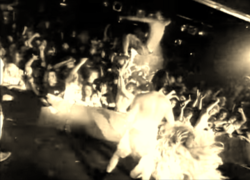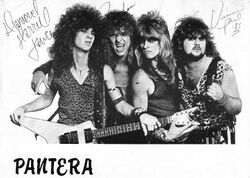Pantera
Pantera is the name given to a group of cattle-herders from the fiery depths down below, who emerged into our realm in the early 1990s to take over the music industry. Their epic tale begins in 1989, when heavy metal had become popular amongst a select group of individuals, despite its original purpose as the Devil's music designed to horrify humanity and cause chaos everywhere (something that the blues had been invented for, yet failed miserably). In order to cause further suffering to humanity for foiling his plans, the Devil summoned a group of metal-loving drunken rednecks, who took the music from the underground and made it accessible to the non-metal public — an act that metal fans everywhere hold contempt for. Such a vulgar display of power caused uproar in the community, and the incident has since been characterized as "Far Beyond Driven" in its depravity.
The chaos Pantera unleashed was captured by nearby audio recording equipment, and people so enjoyed the noise produced by the group that it was distributed around the country. Now dubbed a "band", their vocalist, Phil Anselmo, was famous for his anger issues, and contributed to the band's lyrics. This unlikely combination made Pantera's music the perfect soundtrack to kick the shit out of someone to, giving the band an appeal from jocks everywhere. Tensions arose within the band after Anselmo, despite dubbing himself "The Great Southern Trendkiller", decided to copy every other rockstar of the 1990s by doing heroin, and thus Pantera split up in 2003. Any hope of a reunion was dashed when in 2004, guitarist "Dimebag" Darrell Abbot sold his soul to Nathan Gale just to be buried in a cool-looking KISS koffin. Needless to say, his wish was granted. Though revolutionary and celebrated in the 1990s, Pantera's current legacy is nu metal and having their shirts worn by hip kids who listen to Slipknot. Pantera is now forever (tonight) gone, but never forgotten, and the fortunate souls who were able to experience the heaviest metal band in the early-mid '90s will be accountable to spread the stories of Pantera to the new generation of Imagine Dragons fans.
History[edit]
1983–1989: Glamtera[edit]
Despite what the common detractor will tell you, all die-hard fans know Pantera was not formed until 1989, when they went into the studio to record their debut album Cowboys from Hell. The confusion arises from a 1980s local glam rock group from Texas, who happened to share not only the name "Pantera", but also the same band members. The key difference is that this hair metal band, originally fronted by Terry "Glazed Teriyaki" Glaze for their first three releases, were total posers, while the later groove metal group Pantera were anything but. Four albums were allegedly produced by what is now retrospectively known as "Glamtera", beginning with 1983's Metal Magic, a cheesy ripoff of KISS.
Around the time of their third release, Metallica and Slayer came into the mainstream, and the Abott brothers realised that if they wanted to be a metal band, they actually had to be heavy. And so, Terry Glaze was kicked out and replaced with New Orleans sludge metal fan Phil "Aunt Selma" Anselmo, for their supposed fourth album, Power Metal — which, rather than being original, was merely a ripoff of Judas Priest, and only marginally better than Terry's releases. It should be noted, however, that these four albums don't actually exist, and were made up by Pantera critics to make them look like sellouts and phonies, complete with photoshopped images of Pantera members dressed like Mötley Crüe.
1989–1993: Cowboys from Hell and Vulgar Display of Power[edit]
In 1989, newly formed groove metal band Pantera were performing their new metal material when Derek Shulman, a scout for a major record label company, was in the audience. To the band's disappointment, the scout left midway through the set, but their hopes were lifted when they found out he was merely going for the phone. The band was disappointed a second time when the scout actually phoned a taxi to pick him up and take him as far away from the state as possible.
More bad luck came to the band when another outfit, called Exhorder, stole their newly invented groove metal and released an album featuring this sound. Being the Cowboys from Hell, Pantera weren't going to take this shabby treatment lightly, so they used their demonic powers to wreak havoc and destroy everything using the sound of heavy metal, ensuring Exhorder never became famous. They also threatened Shulman to give them a deal, and so Pantera recorded the noise of their destruction, becoming their first-ever album, Cowboys from Hell. Pantera's debut album Cowboys was their first, and was released in 1990, becoming an immediate success. Though their first ever album, it was also the last album to not feature any tough guy lyrics about beating people up, which the group remedied after its release.
In 1991, Seattle-based alternative-grunge-punk-sonic-noise-rock garage band Nirvana released their second album, Nevermind the Bollocks, Here's Nirvana. This album swooped the media and not only became the best-selling record of that year, but single handedly (with the help of Pearl Jam's Ten Songs to Cry Alone To) destroyed heavy metal, and now once hugely successful metal bands like Metallica and Megadeth were underground and completely unheard of. Metallica's 1991 album Metallica, originally recorded to be the ultimate thrash metal album, was scrapped and hastily rerecorded as a slow, non-agressive pop-metal album. It was now up to Pantera to save metal, but they couldn't do it without changing their style to attract attention. Anselmo shaved off his fruity mowhawk-and-ponytail, becoming a skinhead, while he and the rest of the band donned street clothes and jeans. The end result was Vulgar Display of Power, released in 1992 to massive success, something metal bands had never done since the totally-not-metal subgenre stoner metal grunge took over. With the heaviest record ever released at that point, Pantera had now officially saved metal.
1993–1999: Far Beyond Driven and The Great Southern Trendkill[edit]

But not only had Pantera saved metal — and anyone who contests this claim is wrong — they were now on track to becoming the heaviest band on the planet. Only two bands stood in their way: Alice in Chains, responsible for the death-metal masterpiece Dirt and fronted by scream-master Layne Staley; and the heaviest band around, Soundgarden — a Seattle-based sludge metal group inspired by metal legends Black Sabbath and The Melvins. Pantera laughed in the face of the enemy, and went into the studio to record their next album. Before its release, Pantera leaked a few tracks onto the radio to give audiences an idea of how heavy their next album would be. Horrified at how AiC were no longer the heaviest metal group of all-time (excluding Pearl Jam, of course), Layne Staley became a recluse out of shame. Soundgarden took the challenge and recorded Superunknown, a black metal album heavier than their previous releases. But little did they know that these leaked Pantera tracks were the lightest songs from their upcoming album. Far Beyond Driven was released in 1994 like a kick to the bollocks, a groovy monolith heavier than any death metal album. This victory forced Soundgarden into a self-induced exile out of shame — to this day only two of their albums are cared for by anyone.
Pantera's mess of bleak, depressing Cookie Monster vocals may have seemed like the heaviest album ever made at that point — too heavy for its own good — and so Pantera were now going to return to their old Cowboys from Hell days. That was until Stone Temple Pilots dared to make a heavier album than them with Purple. Furious, frontman Anselmo gargled a cocktail mix of heroin, tobacco, and whisky every day until his vocals were destroyed, and the band proceeded to punch out the heavy metal masterpiece The Great Southern Trendkill. This album toned down the subtlety featured on previous albums, instead opting for guitars downtuned to oblivion, Phil Anselmo's demonic howling, and Anal Cunt's Seth Putnam on backup vocals. In order to be even heavier and redneckier, Phil grew out his hair to metalhead levels, resulting in the finest country-metal album ever produced. Behind the scenes, Anselmo lived a quaint and tech-free lifestyle in those days and as such did not own a radio, and thus had no clue that Pantera were the biggest metal band on the planet, leading to an album full of lyrics on how much he hated the mainstream. This album nearly proved to be Pantera's final album, as Anselmo almost overdosed on heroin.
1999–2004: Reinventing the Steel, breakup, and Dimebag's death[edit]
Though Phil survived, Pantera's music did not, and in 1999 the band went on to record the great disappointment Reinventing the Steel (2000). This album proved to be the same as steel, and those promised a reinvention of steel felt cheated. Uproar was unleashed on the newly-invented Internet about how Pantera were no longer KVLT or TR00, and to make matters worse, inferior nu metal clones of Pantera such as Korn and Limp Bizkit were taking their place. In 2001, Pantera were guest musicians on the stoner cartoon SpongeBob SquarePants in the episode "Pre-Hibernation Week", performing an instrumental of the Steel song "Death Rattle". Creator Stephen Hillenburg had asked Pantera to appear on the show and was known for his quirky music tastes, ranging from Motörhead to Ween to Tiny Tim.
It was clear by now that both Anselmo's heroin addiction as well as his inability to sing for shit was now a problem. On top of this, Anselmo kept ditching them to play in numerous side projects; he changed his name to "Anton Crowley" and played with weirdly named bands such as Necrophagia, Eibon, Viking Crown, Rebel Meets Rebel, Down, and Superjoint Ritual. And so in 2003, while touring in Japan, the Abbot brothers had their revenge and ditched Anselmo in that country, heading home to form nu metal band Damageplan. Bassist Rex Brown went on to join Anselmo in some of his numerous side projects. It seemed all hope was lost.
In 2004, Dimebag Darrell sold half his soul to Van Halen for his yellow-and-black-striped guitar, dubbed "bumblebee". He then sold the other half of his soul to Nathan Gale — a paranoid schizophrenic who had become convinced that he was Gene Simmons — in exchange for a cool-looking KISS koffin. When Dimebag received his coffin, so excited he was that he jokingly said "Shoot me now!"; Gale, who had long lost his grip on reality, granted Darrell's wish. He was buried in the cool-looking KISS koffin while still in the pose of playing the bumblebee guitar. His brother Vinnie Paul Abbot maintained that Gale was really Anselmo in disguise, citing a previous Metal Hammer interview where Phil said that Dimebag "deserved to be beaten severely." Vinnie refused to speak to Anselmo for the rest of his life, while Dimebag's girlfriend Rita told Phil she would "blow his head off" if he attended Darrell's funeral. Of course, Anselmo's speech impediment and inability to finish sentences quickly makes it painful for others to speak to him anyway.
2004–present: Post-breakup[edit]
Pantera was rumored to be reuniting in 2016, but Phil couldn't prevent his racism from coming out and shouted "White power!" at a live show whilst doing a Nazi salute. Thus the reunion never came to fruition, due to the fact that many of Pantera's fans are not white and reside in South America. In 2018, drummer Vinnie Paul's heart machine gave up and he ultimately left to go meet his brother in the afterlife, hoping to spread some thunder across the land for eternity.




